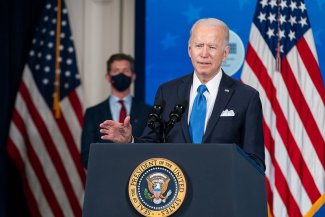The US President has recognised the 1915 genocide of Armenians

On 24 April US President Joe Biden issued a statement in which for the first time he officially employed the term “genocide” in regard to the mass killings of the Armenian community (1915) on the territory of the Ottoman Empire (present-day Turkey). The use of the term was criticised by the Turkish Ministry of Foreign Affairs, along with several Turkish government officials, opposition politicians and the Turkish media (which traditionally rejects the biased and ahistorical interpretation of this historical event). Concomitantly, this highly sensitive issue has previously been discussed by US and Turkish leaders; however, President Recep Tayyip Erdoğan has not publically commented on it yet.
Biden’s statement was met with approval in Armenia. Leading Armenian politicians, including the prime minister, the president and the head of the Armenian Apostolic Church, Catholicos Karekin II, as well as opposition leaders and representatives of the unrecognised Nagorno-Karabakh, expressed their gratitude to the US president, stating that his words meant the recognition of “historical justice”.
Commentary
- 24 April is the symbolic date that commemorates the massacres of the Armenian community in the Ottoman Empire during World War I. The assessments of Western and Armenian historians indicate that these were deliberate actions taken by the state, resulting in the deaths of as many as 1.5 million local Armenians. Turkey (in particular nationalist groups) has consistently rejected these charges and given a substantially reduced number of victims. In the previous decades a host of countries (including the US and its Congress in 2019 and Poland’s Sejm in 2005) have recognised, to Turkey’s irritation, these mass killings as genocide.
- The question of recognising the 1915 genocide of Armenians has been debated in the US for decades – it is part of the US political culture and constitutes a response to the political gravity of Armenian lobbies. Despite the pressure and promises, US presidents (apart from an off-hand comment by Ronald Reagan) have avoided using this term since they did not want it to affect their relations with Turkey - a US ally. However, the current statement has a special and symbolic meaning for the Biden administration: it contributes to fulfillment of US ambition to restore its position as the global political and moral leader. The fact that the universal nature of human rights is being emphasised as opposed to the “transactional” politics that was pursued by the Trump administration also serves this purpose. These issues have been stressed in US relations with China (among them the question of Xinjiang) and Russia (the example of Navalny). In the case of Turkey, this approach comes at a time of strong political tensions between Ankara and Washington particularly in the context of a growing annoyance in the US Congress and public opinion with regards to this stalemate. On the other hand, the US administration is not seeking to break off dialogue with Turkey (this was indicated by the restrained tone of the statement in which the term “Ottoman Empire” is used - not “Turkey”). It should also be stressed that Biden’s declaration, even though it opens up a new stage in the discussion, is of a symbolic character and will not entail any direct legal implications.
- As for Turkey, Biden’s statement has dealt a serious blow to the symbolic sphere, though it is hard to call it a surprise either. Above all - as was usually the case on previous commemorations of the Armenian massacre - the presidential proclamation was subject to speculations in the media, before later becoming officially communicated in a statement. The contentious issue of the 1915 genocide, has also became entangled within the web other grave misunderstandings between the US and Turkey in areas such as security policy (for example, the US support for the Syrian Kurds and Turkey purchasing Russian S-400 missile system, which led to sanctions), regional strategy (for example, disputes on the Mediterranean Sea) and Ankara’s internal quarrels. The issue of Turkey’s responsibility in the 1915 tragedy therefore, challenges the roots of the Turkish Republic’s identity and resonates with the majority of Turkish society, which primarily displays nationalist inclinations. Furthermore, there are serious concerns in Turkey that the official and universal recognition of the mass killings of Armenians may lead to collective claims for damages put forward by the descendants of the victims, above all in the US, but potentially in other countries too. At present, Erdoğan’s restrained response indicates that he is willing to limit the scope of the issue surrounding the genocide and to focus on solving a series of current problems in Turkey’s relations with the US; along with further strengthening cooperation between the two countries (this was expressed in a statement issued following the conversation of the two presidents).
- For Armenia and Armenians, the events of 1915 remain a central reference point for their national identity. Initially, Armenia placed the recognition of the genocide of Armenians by Turkey as a sine qua non of the normalisation of relations between the two countries – Armenia and Turkey till today have not established diplomatic relations and the border between the two countries remains closed ever since 1992. However, with the passage of time it was accepted that an establishment of political and economic co-operation is possible without preconditions. In 2009 the foreign ministries in Armenia and Turkey signed protocols in Zurich which established diplomatic relations between the two countries and fostered bilateral connections. Nevertheless, the protocols have never been ratified due to strong mutual animosity in both countries; the determining factor was that Azerbaijan informally objected to it, claiming that the opening of the borders between Armenia and Turkey would deprive Azerbaijan of a means of pressure on Armenia - which back then (1994-2020) still controlled Nagorno-Karabakh and Azerbaijani territories around it (Armenia was determined to separate the issue of Nagorno-Karabakh from the normalisation of its relations with Turkey). In the short term, Biden’s declaration will strengthen Armenia’s current government and Prime Minister Nikol Pashinyan - who just recently has announced his expected resignation on 25 April (on a side note: the resignation of the prime minister and the failure to elect his predecessor twice in a row leads to an early parliamentary election - which Pashinyan has already announced and stands a real chance of winning it). Biden’s statement constitutes somewhat of a consolation for Armenians after the defeat they sustained in autumn of 2020 during the war with Azerbaijan over Nagorno-Karabakh. In the longer term, America’s formal recognition of the Armenian genocide, as was previously mentioned, opens up the possibility for descendants of the victims to claim for damages their families sustained during that era. This matter is however not being discussed in Armenia, where there are few such people; it plays a far more important role for the Armenian diaspora (particularly in the West).





